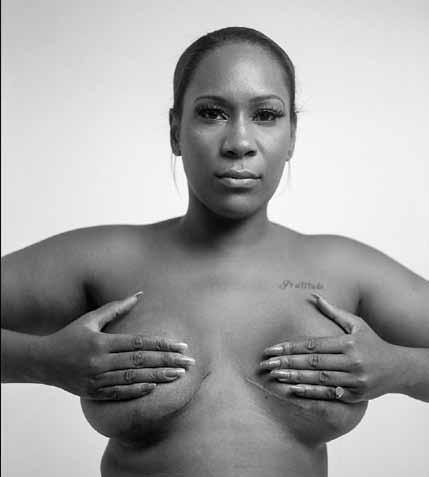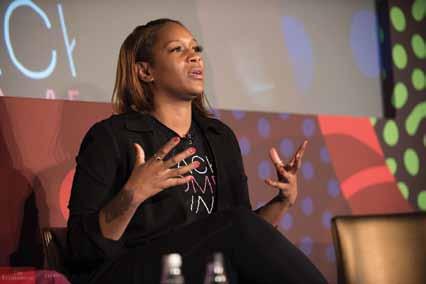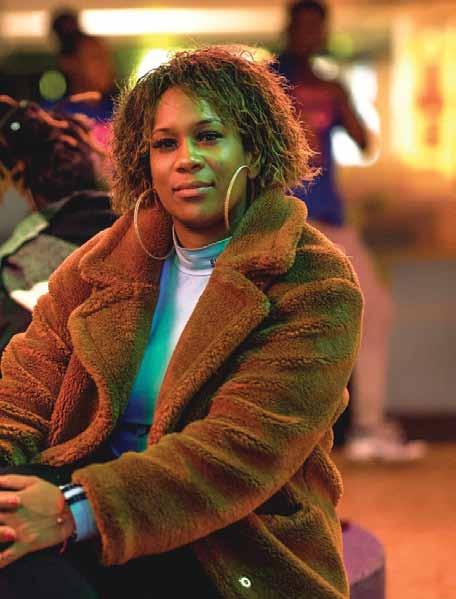
5 minute read
All the right moves
By Cara Cummings
Leanne Pero has spent her life tackling social issues in south London, from youth exclusion to BAME experiences of cancer. The multi awardwinning entrepreneur and unsung hero shares her story of dance, devastating diagnoses - and that time she punched through a window to save a community show...
Advertisement
Leanne Pero is not someone to Google if you’re feeling like an underachiever. The Peckham powerhouse set up her iconic Movement Factory youth dance company at just fifteen; has created pioneering work for Nike, Kelly Holmes, Rio Ferdinand and the Houses of Parliament and won every award going for her community-focused entrepreneurial prowess. She’s also a stage-3 cancer survivor; the founder of Black Women Rising, a charity for BAME patients battling the disease; an author, a mentor, and the CEO of Pineapple Dance Studios’ first charity, Pineapple Community. It’s no wonder she struggles with her job title. “I actually don’t know what to say,” she laughs. “Call me a boob-checking, community advocate cancer warrior... I just don’t know any more!” It’s a typically self-effacing summary from the unassuming entrepreneur, whose sunny warmth stems from a love of movement - “my mum says I was always jumping around; no one could keep up” - and a passion for giving back. “I’m here to serve the community with a safe space and a friendly smile,” she says simply, “because it can help people create positive lives for themselves. How do I know? Because I’m the biggest example.” Leanne’s extraordinary story has several dark chapters. She hasn’t just triumphed over adversities - she’s turned them into something positive, since childhood.

“I was sexually abused from the age of ten to 13 by a trusted family friend,” she explains. “When I came out about it, it caused a lot of distress; I wasn’t really believed. Dance saved me. I was offered no mental health support, so dance was my mental health support.
“I really wanted to create a safe space for other young women who were going through things like myself. That was my ethos - and twenty years later, it’s still the ethos. “We’re living in a time when mental health problems are off the Richter scale,” she continues. “Young people are suffering. They’re expected to do well at school, be a certain size, look a certain way. They’re being bullied, cyber-bullied, trolled; there’s a lot making young people not feel good about themselves. The arts give them a couple of hours a week to focus on something positive, where they can achieve.” Leanne has gone to incredible lengths for her proteges. She once punched through a window after getting locked out of her rehearsal space hours before a massive show. “All of our costumes were in there, everything,” she says. “There was no way I was letting that show be a disaster.” She’s still got the scar on her right hand.

After fifteen years of running her business through good times and bad, life was on the up for Leanne. She had just turned 30,
Movement Factory was thriving, and Pineapple Dance Studios founder Debbie Moore had personally asked her to run the iconic brand’s fledgling charity, bringing dance to marginalised young people across Britain. “I thought - ok, that’s me done now,” Leanne recalls. “I can live a really good next chapter… But no. Life had other plans.” Weeks after her mother was diagnosed with cancer for the second time, Leanne found a lump in her own breast. “I walked into the doctor’s and my mum’s consultant was waiting. I thought: f***. Suddenly, bam: I’ve got cancer. “I don’t think anything can ever prepare you,” she says quietly. “The first couple of months of cancer were horrendous. You wouldn’t even wish it on your worst enemy.” Leanne went to ground, battling chemotherapy and a double mastectomy with the support of close family and friends. When she publicly revealed her condition, the reaction was overwhelming.

“I was unprepared for how many women would actually contact me,” she admits. “The majority were young women of colour, saying: ‘It’s nice to see a brown face talking about cancer.’ But people also shared some horrific stories - like being told their cancer is a curse for their past, or not to take the drugs because God will cure them. Women suffering from intimacy problems, feeling embarrassed about their operations; even being advised by their churches to keep their breasts despite doctors telling them to have a mastectomy. I just thought - we have to do something to educate our communities.”
Leanne set up Black Women Rising to bring the experiences of BAME cancer patients to the fore - and educate both the communities they come from, and the services supporting them through the disease, about their needs. “Take Macmillan’s free wigs,” she says. “Guess what? None for black people; or a massive book with four pages at the back, but they’re all taken. That’s what happened to me when I was
in hospital: nothing for afro-hair. “And you won’t connect with an eighteen year old black girl who needs to check her breasts by putting all white, older people on your advertising posters either. Since the project has started, people are listening. It’s fantastic.”
With breast cancer now the most common cancer in the UK, Leanne’s mission remains urgent. “The mortality rate for breast cancer patients from BAME communities is higher than our white counterparts,” she stresses, “because people are getting checked later. They’re still not recognising the symptoms, so we still need to do more.” True to form, Leanne has reclaimed her cancer as a positive - and a way of supporting others. “It’s been a struggle for me to manage my self-confidence through the years,” she admits. “I think it took cancer coming along for me to realise: ‘Leanne, you’re good enough, and you deserve all of the positive stuff that’s happened to you.’ I never believed it, up until that point.
“Now, it’s about practising what I preach and building self-belief for others. That’s all I’m here to do.”

